Interview: Leo Bill & Tony Grech-Smith on THE TRAGEDY OF KING RICHARD THE SECOND NT Live
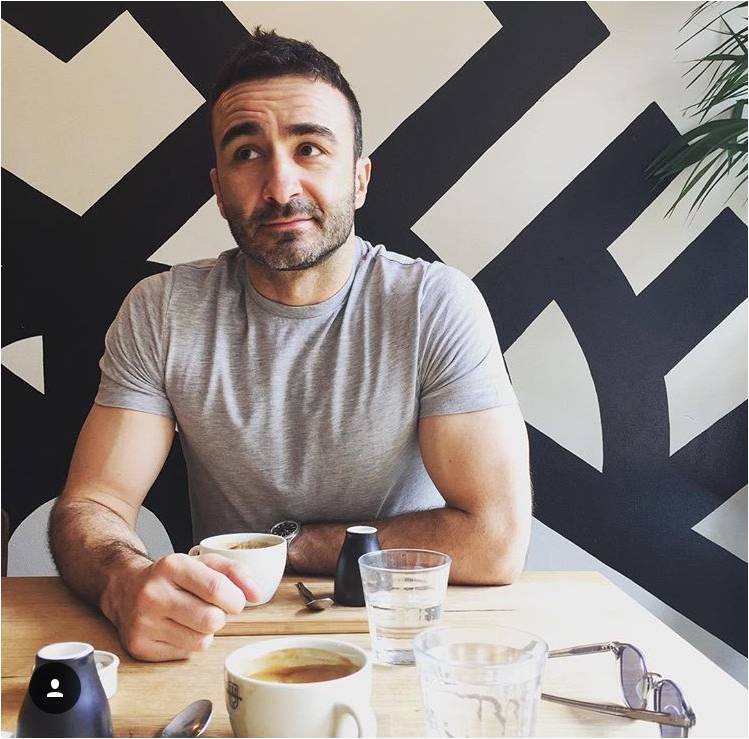
The Tragedy of King Richard the Second marks the Almeida's first National Theatre Live screening, broadcasting to audiences around the world on Tuesday 15 January.
We spoke to actor Leo Bill and Camera Director Tony Grech-Smith, to find out how those onstage and those behind the scenes (and screens) prepare.
TONY GRECH-SMITH, CAMERA DIRECTOR, NT LIVE
Thanks for chatting to us again! When we spoke last year about the Bridge's Julius Caesar broadcast, you shared how you got involved with NT Live. Can you tell us a bit more about your start in this industry?
I always wanted to work in television, particularly multi-camera so I studied at the Ravensbourne School of Broadcasting. And coming into NT Live, I came from a studio and entertainment background, working on shows like Strictly Come Dancing and Top Of The Pops.
So you've worked across live broadcast for television, and now cinema and theatre?
Yes and I love doing NT Live, because it's a chance to get really creative which doesn't always happen in live television.
With TV, you're often keeping a show running and it's reactive. Camera scripting a play is so different, because you can consider every shot - watching a 'scratch tape' (which is a wide shot) to visualise the best shot for our audiences.
If you're in a theatre watching, your eye goes to the bit of detail happening in that moment; in cinema, that can't happen so I choose the best shot for you, considering about what tells the story best in the moment.
I imagine you and the director must work very closely together, to make sure you're conveying that?
Yes, it's interesting. This is the sixth NT Live that I'll have directed, and every stage director is different.
Whenever we approach an NT Live, I sit down with the director and they'll talk me through the play. With The Tragedy of King Richard the Second, that happened quite a while ago before it even went into rehearsals.
Joe [Hill-Gibbins] showed me some photographs of the set model and explained it was going to be very stark and that everybody was going to be on stage all the time. It really helped having spoken to him when I then went to watch the first preview as it gave me a good indication of how Joe intended the play to come across.
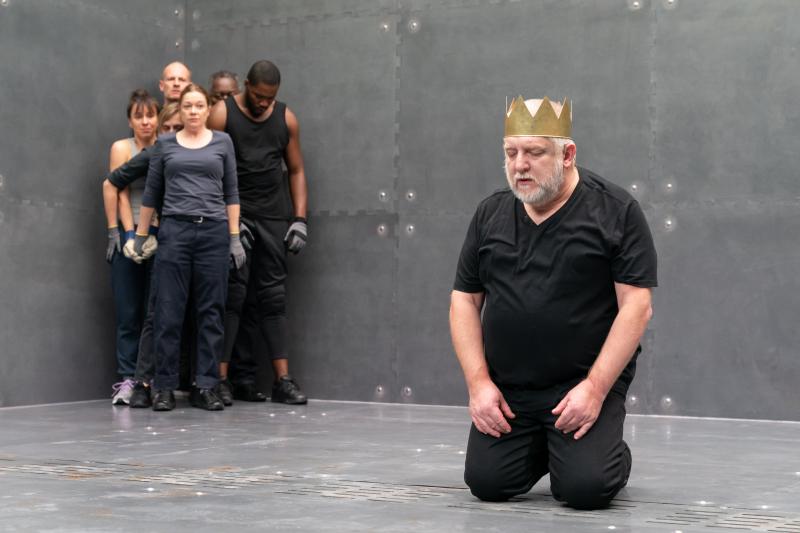
of King Richard the Second
What's the run up to this broadcast for you?
Well, we had that chat and I got the scratch tape and I watched it loads... I think I've already seen it about ten times! Then I camera script it myself, choosing what I want from the shots. We shoot the first rehearsal and we sit down after he's watched that recording. That is the first time he can give me any input.
Right at the moment, I'm going through my rehearsal, looking at all of the cameras' outputs and choosing the right shots and the right angles to make sure I'm conveying the story as best I can.
And where are you positioned on the night?
I sit in one of the trucks outside the theatre. We're at the Almeida which sits on a residential street which is a dead end...and we've got three massive trucks down there!
Our room's a bit like mission control. On the front desk, to my right, I have Mark Foster, the vision mixer, who's brilliant. He cuts the cameras. To my left is Amanda Church, my script supervisor, again really experienced and she calls every shot.
I'm in the middle guiding everyone along, because I know the play so well. So although a shot may be scripted on a particular word, you can't quite convey the sense on paper. For example, "Just after he says that word, he's going to take a breath and he's going to look". I know that so I'll say, "Hold, wait. And...take it." It just allows the performance to breathe so the cuts aren't too quick.
So with the variety of shots, how many cameras do you have?
Here at the Almeida, we have six cameras.
We've got two tracking, manned cameras in Row G of the audience. Immediately in front of that I have a wide shot, and immediately in front and just below that, I have another remote camera for group shots. Finally, I have two other cameras almost on the edge of the set to cross-shoot.
This is your first time camera directing at the Almeida. I imagine the intimacy of the space must pose some unique challenges?
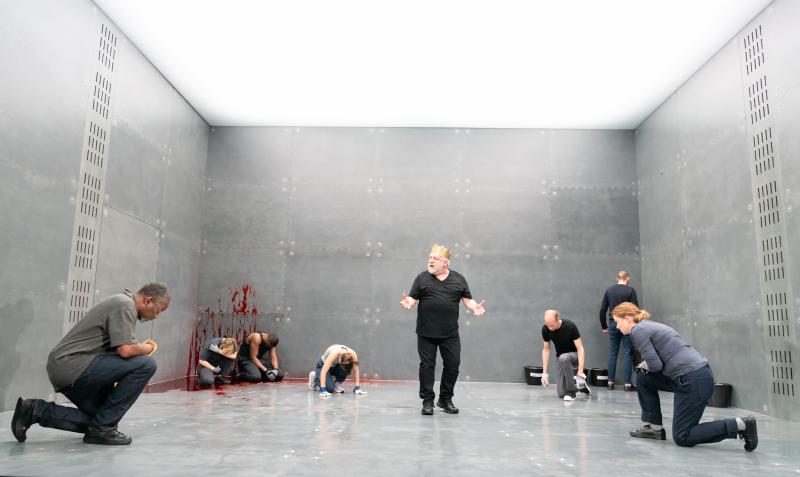
King Richard the Second
Yes. By comparison, in December I shot Antony and Cleopatra in the Olivier and we had a 15ft jib (like a crane), as well as six other cameras.
Trying to find a position for the wide shot in the Almeida was tricky - the balcony is so close to the front of the stage. In that respect, it's similar in terms of intimacy as the Donmar. And it's not just cameras to think about - it's just as tricky for our sound team too, supervised by the brilliant Conrad Fletcher.
Because it's ultimately eight people in a metal box, there's nothing to deaden any sound. Sound travels and bounces off walls. During theatrical performances, the cast don't wear microphones. But we need them to for this, otherwise we won't get the dynamic range that we need for 5.1 surround and for the cinema audience.
Do you think an NT Live cinema audience gets something a little different then?
For me, the great thing about the cameras is what you might not see in a theatre.
In the theatre, you'll catch moments; but when you've got close ups, you suddenly see facial expressions that you may not have noticed. Even Joe did that the other day! He saw something, laughed and said, "That's really funny".
And that's really important with this performance. You might not expect a History to be funny. But with Joe's production, it's there. I'm hoping our cinema audiences will also see the comic performance that is within it, and one of the ways to achieve that is through those close ups.
Leo Bill - BOLINGBROKE, THE TRAGEDY OF KING RICHARD THE SECOND
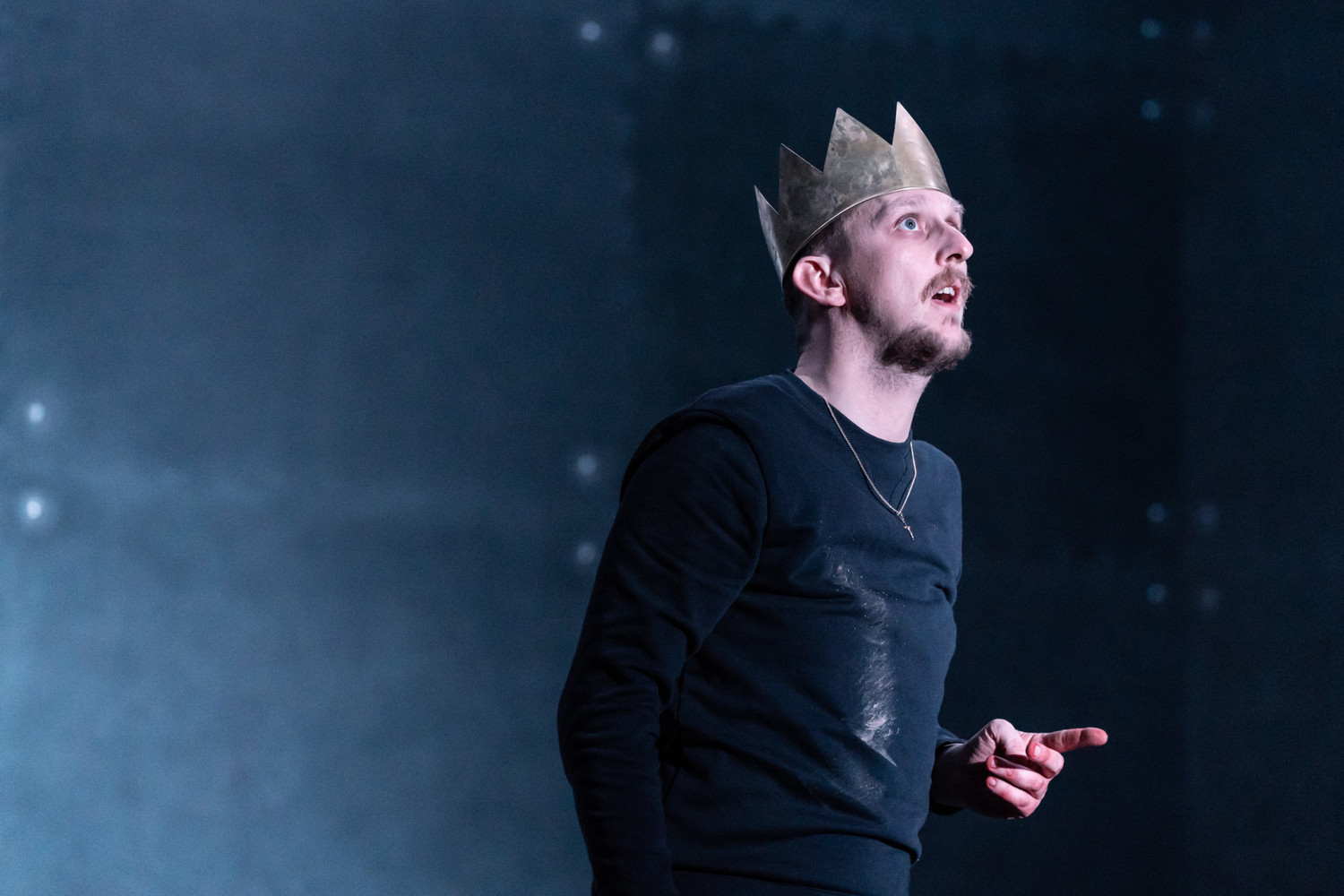
Richard the Second
What is your earliest memory of Shakespeare?
I did the Scottish Play when I was about eleven and I was Fleance. It was with Derek Jacobi and Cheryl Campbell, and I did a tour of it for the Royal Shakespeare Company. That was my first ever Shakespeare, just thrown straight in there right from the beginning!
And you've done quite a bit since that early start: playing Horatio in Lyndsey Turner's Hamlet and Bottom in Joe Hill-Gibbins' A Midsummer Night's Dream.
Yes. But you know what? I left drama school in 2001 and I didn't do Shakespeare for ages, nor did I have a huge desire too either.
The first Shakespeare I ever did properly was Richard Linklater's film Me and Orson Welles. It was about Orson Welles' Mercury Theatre company and they stage Julius Caesar, so I had to do some Shakespeare.
It sounds really stupid but I remember thinking, "Oh wow, this is actually really good!" Every time I do a Shakespeare, it's like a surprise to me how amazing it is.
Has that been the case with The Tragedy of King Richard the Second then?
Exactly and I didn't know it at all. Even Bolingbroke, I'd heard of him and I kind of knew he became Henry IV.
We were given this version which had been worked on by Joe and our dramaturg Jeff James, and it has cut down what can be three and a half to just over an hour and a half. I stayed away from looking at the original text for quite a long time, until rehearsals. I wanted to treat it like a new play. So I was like, "Okay, I'm reading a completely brand new play, which just happens to be in verse".
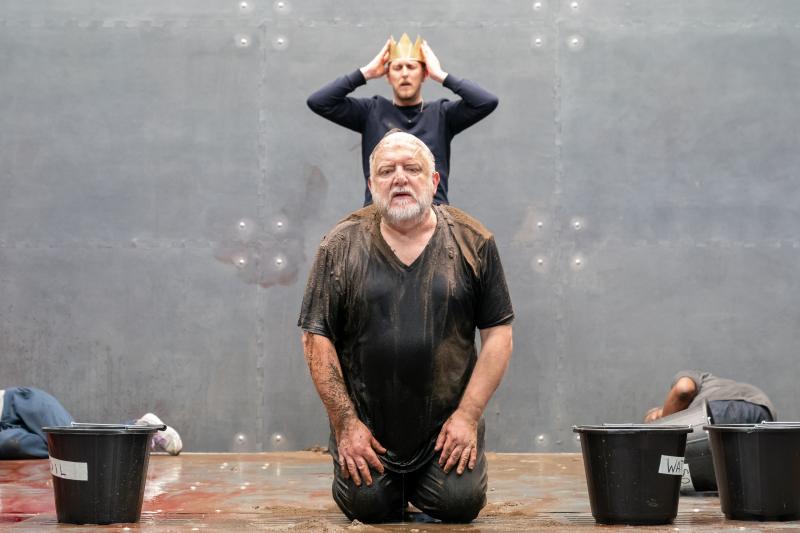
The Tragedy of King
Richard the Second
So what were your initial impressions of Bolingbroke?
I talked with Joe before rehearsals and we had some mad conversations! We were talking about Carlito's Way, Scarface came up at one point! Dodgy guys, gangsters in white suits. Then when we got into rehearsals, it wasn't that at all. But I normally find that I tend to start quite extreme somewhere, and end up getting as far from that as possible!
Like A Midsummer Night's Dream: my first thought was, "Okay, I think Bottom should be like Serge Gainsbourg. He should dress really slick and maybe he smokes a lot." The next thing I know, I'm in cuban heels and I've got a long wig on, up to my knees in mud!
I remember sitting front row for that, in the Under 25 seats...I was not expecting that much mud!
No, I mean I wasn't either! Thankfully having done that, I knew sort of what to expect for this one, reuniting with Joe.
We spoke to Tony Grech-Smith about working with Joe on preparing for the night, from directorial perspectives. What's it like for you as actors, in the run up to the broadcast?
We did a full run in the afternoon for NT Live this Monday, with all the cameras. Then we had a normal evening show. So it's a nine show week these weeks. Next Monday, we do our second camera rehearsal, then a show Monday night, and NT Live is Tuesday. So it's quite intense!
NT Live though have been really good. They've got people in so we've actually had an audience to watch those runs, which is good for them because they get a sense of the audience. It's good for us too. It's very weird to be doing a show and to suddenly come out and you're doing it to nobody, that does things to your mind and your adrenaline.
This isn't your first NT Live, is it?
No, we did one for Hamlet. I remember, we did the curtain call in the Barbican Theatre and then we ran downstairs to screen one in the Barbican cinema and did another curtain call there, which was amazing.
The whole nature of that production was huge and mad. And because the Barbican is so huge, you're so unaware of the cameras. That's going to be really different here at the Almeida, because it's a much smaller, intimate space.
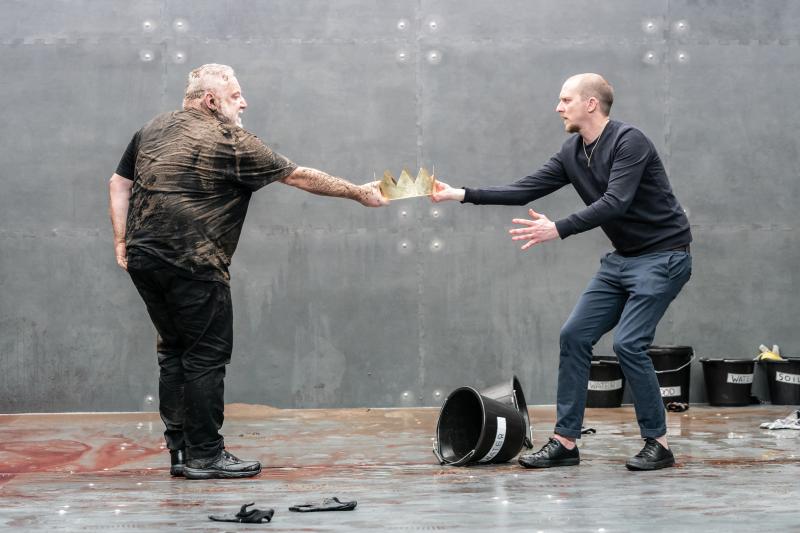
The Tragedy of King
Richard the Second
How do you think Joe's vision is going to translate from stage to screen?
Well Clint Dyer came to the first preview, and he told us how cinematic he thought it was, how it was very contained. And that filmed rehearsal from the other day, Joe and our assistant director Lucy watched it at Screen on the Green in Islington. Apparently it looks amazing.
The great thing about NT Live too is you do get close ups, but it sounds like the wide, straight on shot of the set is kind of incredible.
You'll have to try and see it, if NT Live do one of their Encores!
You know what? I actually said the other day that I might do.
I've never seen an NT Live and I've always meant to and I've always missed them. A bunch of us from Hamlet were going to go, but it never happened. And I've just got to the point in my career where I can just about watch myself now! You know, whether what I'm doing is passable or not! So I'd kind of love to see one and with this one, I would love to just see what it looks like.
The Tragedy of King Richard II will be broadcast live to cinemas across the UK and internationally on Tuesday 15 January, as part of National Theatre Live
The Tragedy of King Richard the Second at the Almeida until 2 February, 2019
Check out our interview with Saskia Reeves and review
Photo credit: Marc Brenner
Comments

Videos

